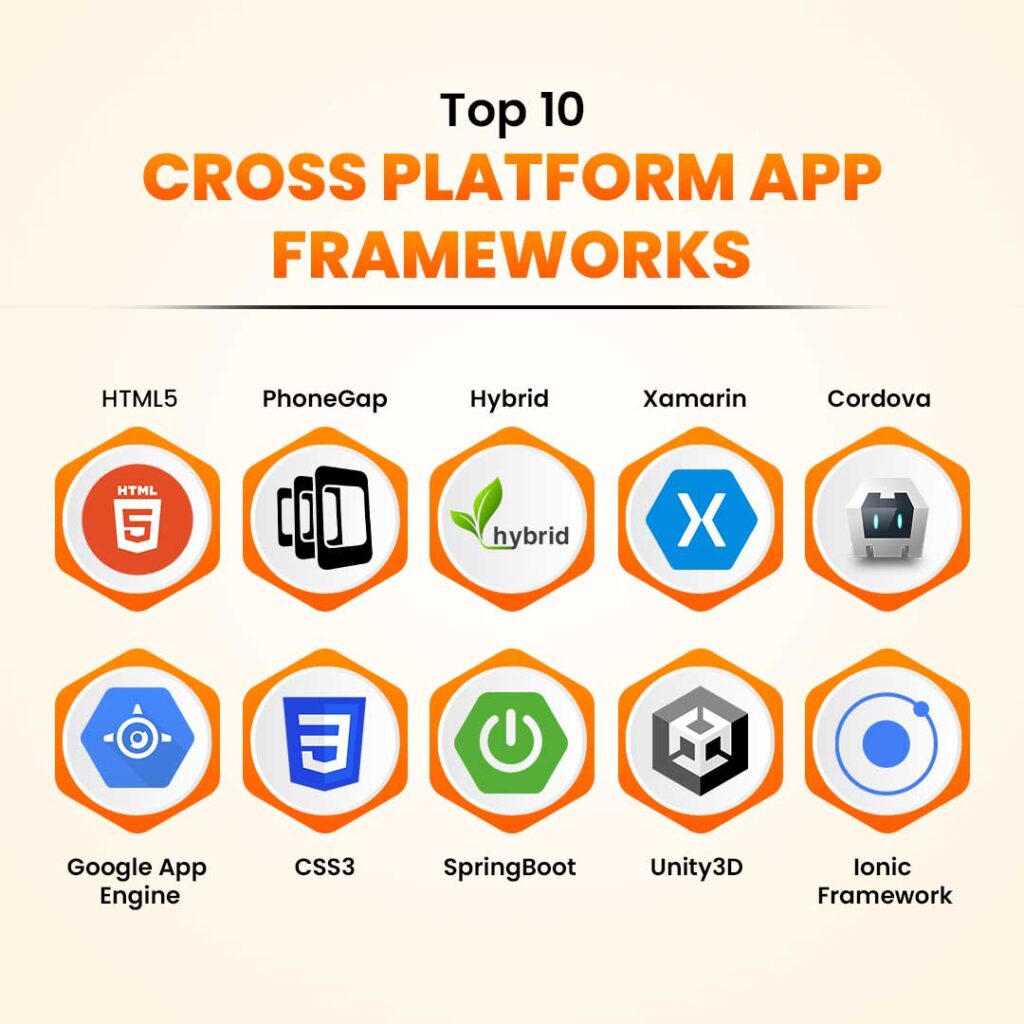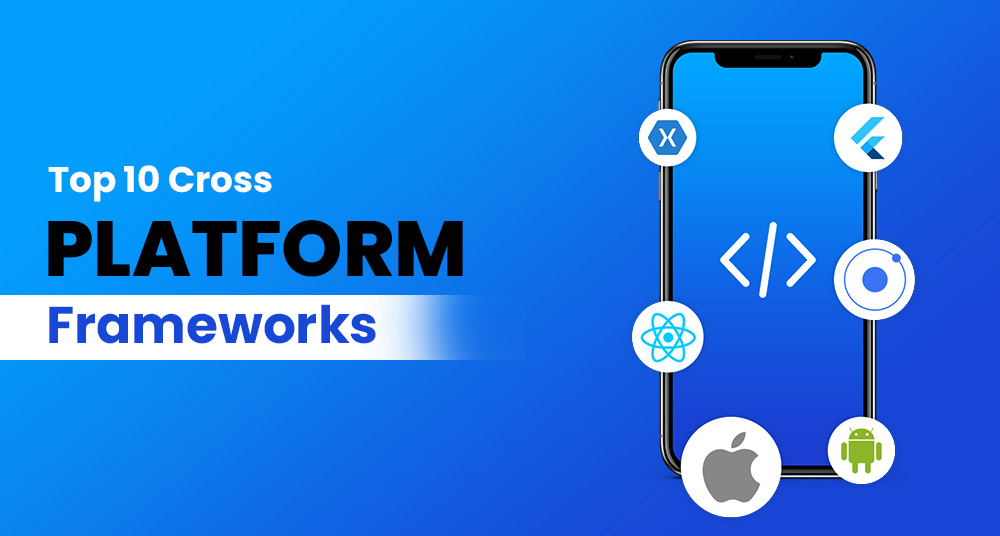Cross platform mobile app development is still in its early days. It’s no secret that the adoption of cross platform mobile development is still on an uneven playing field. The outcome? Most businesses ponder whether their application will ever be used. If you’re serious about making your business accessible to customers worldwide, you should consider developing cross platform apps from the get-go. This helps avoid potential roadblocks and makes your app development process more streamlined and flexible. In this post, we look at some of the most promising cross platform app frameworks out there today and rank them from best to worst based on their ability to make developing cross platform mobile apps easy and fun.
What is a cross platform mobile app?
A cross platform app is software used on multiple mobile devices and platforms. To build a cross platform app, you will need to develop the app once for multiple platforms. Since each platform is built with different hardware and software, the app will likely look and perform differently on each device. Developing a cross platform app is the most challenging part.
You’ll need to consider the hardware, performance, and user experience differences between each type of device. Cross platform apps are the future of app development. Companies like Google are pushing developers to create single apps that can run across Android, iOS, and the Web. This makes it easier for businesses to update their apps with new features or functionality without rewriting the app for each device.
How to Build a Cross Platform App?
Developing a cross platform app requires a unique skill set not used for creating native apps. It takes experience working with many languages and platforms and a strong understanding of software development. Cross platform app development involves building the app once for multiple platforms. Since each platform is built with different hardware and software, the app will likely look and perform differently on each device. Cross platform app development is challenging because it requires a skill set rarely used for building apps. That’s why you must hire a Cross Platform App developer with excellent app development skills. It takes experience working with many languages and platforms and a strong understanding of software development.
Apps are the future. Build for them now
The future of mobile apps is in the native app, or the app designed to run on phones and tablets. Over 60% of all mobile app downloads are from non-Google Play stores, with iPhones taking the second-place position at 31. To maximize the potential of your mobile app, you must place your strongest foot ahead. That is why it’s critical to know what your audience wants and make your app reflect that. You accomplish it by creating an app that users will adore.
You can gauge consumer sentiment towards your app by conducting an app review survey. Popular apps like Netflix, Instagram, and Facebook have millions of users, and you can learn a lot from their reviews. You can also look at the number of questions your users have asked you and reflect on that in your analytics. It’s important to note that these will differ from your user experience and help you understand how your app performs from a user experience standpoint.
Why is your business accessible to customers around the world?
Developing apps that are accessible to customers around the world has become a priority for today’s business leaders. Increasing internet usage has made it possible for many individuals to live limitless lives today. By providing services such as instant messenger, email, blogging, and more, the Internet has democratized access to information for many people. However, the internet has also made it possible for people to be isolated. In a traditional business setting, you might not think about the social impact of having a website that is only accessible to people in your local area. However, the impact of not being able to reach customers in other areas can be significant.
Top 10 Cross-platform app frameworks

1-HTML5 Canvas Mobile Development Frameworks
HTML5 Canvas Mobile Development Frameworks is a concept that was introduced roughly a decade ago. Today, most major platforms (iOS, Android, Windows Phone) and even older devices like the Nokia Nseries and Amazon Fire support the canvas element. With the canvas element, developers can create apps that run on all these platforms and work across different devices without requiring code rewriting or modifications. Many HTML5 Canvas Mobile Development Frameworks have been developed to meet the needs of corporate businesses and individuals interested in mobile app development. Some popular ones include Hybrid Mobile Apps, Canvas By PhoneGap and More.
2-PhoneGap Canvas Mobile Development Frameworks
PhoneGap Canvas Mobile Development Frameworks are another concept developed around a decade ago. These frameworks are made to work across multiple platforms and devices with minimal code changes by leveraging existing PhoneGap/ng-PhoneGap libraries for each platform. With PhoneGap app Development Frameworks, you can use the same code base regardless of which device or platform your app is running on. Beyond just using existing libraries, PhoneGap Canvas Mobile Development Frameworks allow you to create hybrid apps that allow your app to work across both iOS and Android devices without having to do much work on either end. An example of a hybrid app using PhoneGap Canvas Mobile Development Frameworks is the Uber app for iOS and Android.
3-Hybrid-mobile-apps- Frameworks
Hybrid-mobile apps Frameworks are a family of tools that aim to provide an easy way to develop a hybrid app. They try to blend the best aspects of HTML5 and native mobile development techniques to create an ideal solution for the developer. Many hybrid-mobile apps- Frameworks are created to be cross platform, meaning they support both iOS and Android apps. Others, however, are only made to work on one platform at a time—for example, only supporting iOS. A hybrid-mobile-apps- Framework is a work-in-progress.
At its most basic level, it’s a combination of tools you can use to build hybrid apps. However, at their most advanced, hybrid-mobile apps- Frameworks allows you to create apps that run on both iOS and Android devices simultaneously.
4-Xamarin Mobile Development Frameworks
Xamarin App Development Company are one of the most successful mobile development company. Xamarin Mobile Development Frameworks are a family of tools that are constantly evolving. Xamarin is a multi-platform app development platform. Xamarin is used to create apps that work on the Web and mobile devices. It offers an app development environment that allows you to create iOS and Android apps using a single code base. Xamarin’s tools offer a series of benefits, including a shared codebase, increased productivity, and access to native device capabilities. With little any performance effect, it’s like using two programs in one. The latest version of Xamarin supports the Windows 10 Store, where most Windows apps are published.
5-Cordova Smartphone Programming Frameworks
Cordova is one of the greatest well-liked frameworks. The Cordova Mobile Development Framework came about five years ago. Mozilla created the mobile developer framework called Cordova, which was first made available in 2012. Cordova has been used to develop many different types of mobile applications, including web applications, native apps, and hybrid apps. Cordova is applied to create any kind of mobile application It is easy to use and has a huge community behind it. Many different Cordova plugins are used to customize the framework and make it easier.
It’s based on the C# and Mono.NET languages and allows you to create hybrid apps that are either cross platform (run on both iOS and Android by default) or native (run on one platform only without the need for an app extension). One of the most common plugins is the Cordova CLI can quickly create new applications and deploy them on devices. Another popular plugin is the Cordova CLI for Android, which allows developers to create Android apps using Cordova.
6-Google App Engine and Cloud Functions for Cross Platform Apps
Google App Engine and Cloud Functions for Cross Platform Apps are essentially the same engine running JavaScript and Web APIs and tools to host and scale them. The only difference is that Cloud Functions for Cross Platform Apps runs on the cloud rather than your server. Most people have heard of or used Google Apps already. But did you know that Google is now also providing a software development platform as a service (SDK) for building apps with its Google App Engine?
7-HTML5/CSS3 Hybrid Apps
Hybrids are apps that use the classic approach of using HTML and CSS to format and style the app and the more modern approach of using JavaScript to create the app’s behavior and extend its functionality. Hybrids are ideal for modern apps that want to use one codebase across iOS, Android, Windows phones, and even the Web. Because the hybrid approach is more complicated to create, it’s not found in every app. However, it’s one approach many companies choose to make their app visually appealing while remaining cross platform.
8-Spring Boot + Web development stack
Spring Boot is a lightweight and flexible application framework. It simplifies the development process by allowing you to create standalone, production-grade applications with minimum effort. These applications can easily be deployed on external staging/production environments and automatically transferred to a new environment. They can also be scaled horizontally across multiple machines and configured for different environments Web application development stack is the term used to describe the set of tools and technologies required to build a website. Many web application development stacks are available, such as React-based stacks, Angular-based stacks, etc.
9-Unity3D
Unity3D is a cross platform game development platform for creating 3D mobile, console, VR, and desktop games. Unity creates a bridge between the game developer and the game player. This means users can access and play your games regardless of their device. Unity is a popular choice for game developers and has won numerous awards, including being named by Gartner as a Cool Vendor in 2018. With Unity, you can create games that run on multiple platforms, including mobile, desktop, VR/AR, Xbox One, and Nintendo Switch.
10-Ionic Framework
The Ionic Framework is your best option if you are looking to build native iOS or Android apps. It’s a comprehensive toolkit that includes:
- Full-stack design tools.
- A rich library of mobile-optimized HTML/CSS components.
- A hybrid app development environment.
Ionic is free for smaller projects and offers a free plan for teams building commercial apps. Ionic offers a hybrid app development environment that lets you use web technologies and native capabilities. No matter if you’re starting from zero or migrating an existing project from another technology stack, creating hybrid apps is simple. Hybrid app development with Ionic is fast and reliable.
An Overview of Platforms and Frameworks for 2025
The rapid adoption of intelligent devices and the growing demand for mobility have made app development critical for businesses and organizations. However, building mobile apps isn’t easy. It requires developers to learn new skills, invest in costly tools, and, most importantly, spend time. Several cross platform frameworks have emerged to address these challenges and make app development more straightforward. They help developers work faster and more efficiently by reducing time spent learning new skills. In 2025, most of the frameworks and software platforms will be cloud-based, as they will be more cost-effective. They will also be hybrid-based, as they will help developers bridge between cloud-based and on-premise environments.
Final Words: Will Cross Platform Mobile Development Save the Day?
The development of cross platform mobile apps is still in its infancy. There is no doubt that there are still disparities in the acceptance of cross platform developing apps. Most businesses ponder whether their application will ever be utilized. You can expedite and improve the app creation process with minimal commitment. By creating software that runs on multiple platforms, you can test your app on a large variety of devices and gain valuable feedback from users.
You can also benefit from the reach of apps like Uber, which has been tested and refined across multiple continents. If you are serious about making your business accessible to customers worldwide, you should consider developing cross platform apps from the get-go. This helps avoid potential roadblocks and makes your app development process more streamlined and flexible.






What do you think?
It is nice to know your opinion. Leave a comment.